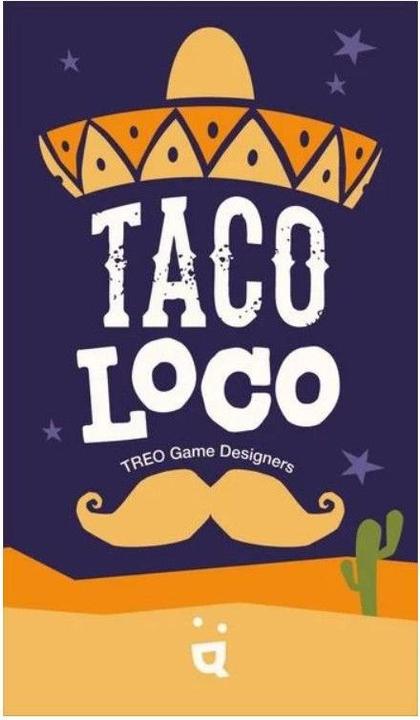
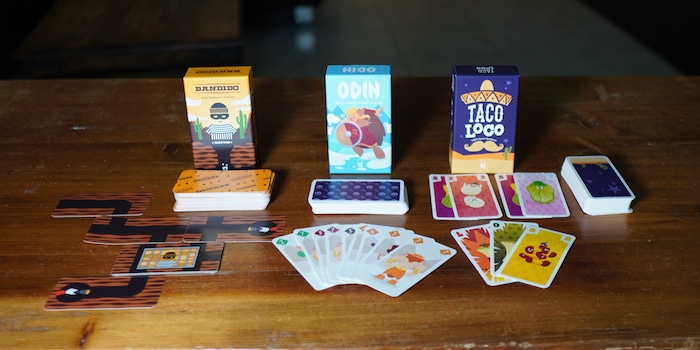
Compact and surprising: How good are Helvetiq's mini-games?
The Swiss publisher Helvetiq specialises in small card games, among other things. I tested three of them, which offer a very different experience with identical game material.
Three colourful boxes lie in front of me: eleven centimetres high, six centimetres wide and three centimetres deep. I find the same thing in each box: folded game instructions in six languages and a stack of portrait-format cards
Two packs contain 70 cards each, one only 54 cards. The publisher from Lausanne has developed three different games from these similar premises. I also came to three different judgements after testing them.
Excellent: «Taco Loco»
- From 7 years
- 2 to 5 people
- 15 minutes playing time
- 70 cards
This game is simple but exciting - that's probably why I liked it best in test rounds with the family. You have three cards with values from 0 to 9 in your hand, discard one at a time and draw. If your pile reaches 11, you can place it on the discard pile of another player. If you are only able to place the cards in such a way that the value exceeds 11, you must take the pile yourself. Two special cards ensure that a pile is set directly to 11 or back to 0. Whoever has the fewest cards in the pile at the end wins.
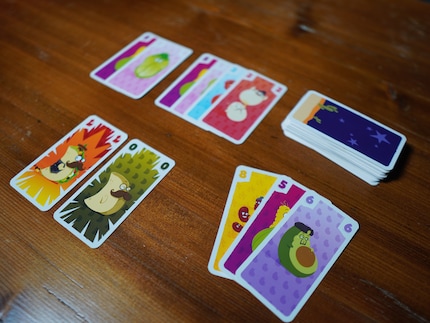
Round after round, we quickly and easily fill stacks, deal out more cards and start again. Although the rules are simple, the gameplay is similar and the players don't interact much with each other, the card game keeps coming back to the table. Despite the high luck factor, «Taco Loco» is also fun for all those who take a tactical approach. Because somehow the plans usually work out, even with bad luck.
The topic is funny, but only serves as colourful packaging. The fact that you fill tacos with the ingredients depicted on the number cards when building stacks is irrelevant to the game.

Good: «Bandido»
- From 6 years
- 1 to 4 people
- 15 minutes playing time
- 70 cards
As with «Taco Loco», Helvetiq has packed 70 cards into the boxes - plus a thicker starting board. However, author Martin Nedergaard Andersen has not turned this into a trick-taking game, but rather a co-operative laying game.
The cards depict tunnels with one or more entrances and exits. Each player has three cards in their hand - and must add one of them to the existing tunnel system each round. This creates an underground system on the table - until all the cards have been placed.
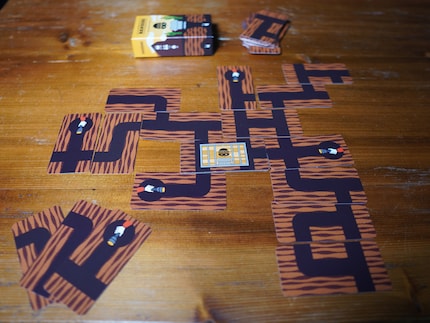
The common goal of the players: Close all the exits if possible so that the «Bandido» on the starting map cannot escape. This is easier said than done, as only a few cards have dead ends printed on them. It's much more common to open more junctions with every move and hope that you can close them later with the right card.
The supposedly «small» game takes up a lot of space on the table. And it can be frustrating, as the chances of success for the team are not great, depending on the luck of the cards. Although we weren't able to close all the tunnels in most of the games, we still had fun puzzling and building together.

Helvetiq Bandido
German, Spanish, French, Dutch, Italian, English
Mediocre: «Odin»
- From 7 years
- 2 to 6 people
- 15 minutes playing time
- 54 cards
Helvetiq also combines number cards with a rather random topic. This time there are no taco ingredients printed on the cards, but figures from Nordic-Germanic mythology. But you can forget about them right away - the numbers and colours of the cards are what's important. The aim is to discard all nine cards in your hand as quickly as possible.
The starting player lays down a card. After that, the same number of cards or one more card must be played. The value of the cards must increase steadily and only cards of the same colour or value may be played. For example, if you play a green 2 and a green 4, this does not count as 6, but as 42 - the highest possible value of the combined cards always counts.
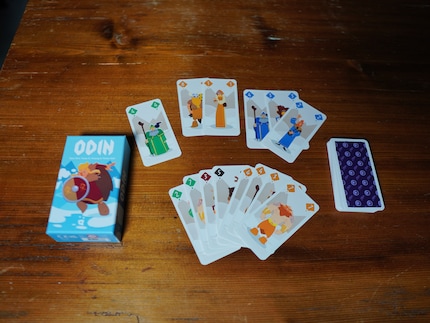
The trick that makes the card game interesting is that you have to pick up one of the cards on display again after playing. And thus optimise your hand for the next round.
The problem with «Odin» is that it doesn't really get going in small groups of two or three. The rounds are very unbalanced and seem arbitrary. With more players, it is important that everyone understands the tactical finesse of optimising the hand of cards. Otherwise the games are one-sided and no fun.
In my opinion, the card game only works in large groups with experienced players. Others like the title much better: «Odin» won the French critics' award «As d'Or 2025» in the category «Game of the Year».
The game is a great success.
It's exciting how Helvetiq has created three very different games with just a few dozen cards, but I don't think they're all equally successful. Incidentally, the Swiss publisher is very fond of this format. Now in stock, you can find at least a dozen more such card games in the small cardboard box.
Gadgets are my passion - whether you need them for the home office, for the household, for sport and pleasure or for the smart home. Or, of course, for the big hobby next to the family, namely fishing.
Practical solutions for everyday problems with technology, household hacks and much more.
Show all


